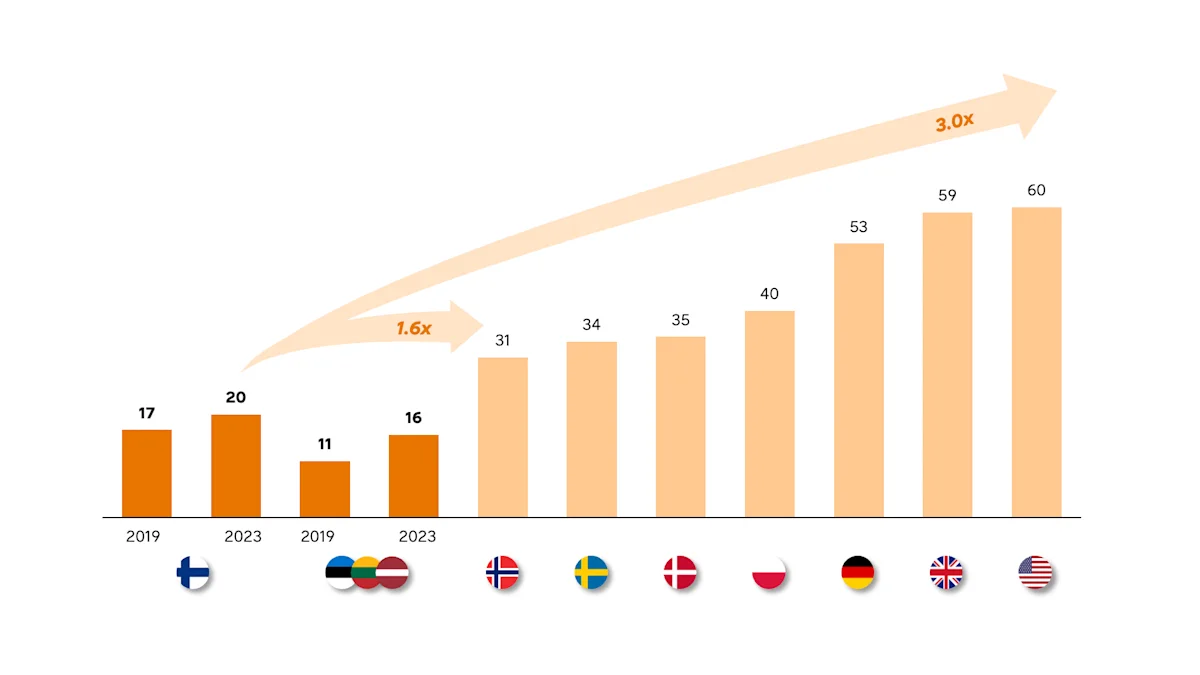Overview of the Postal Services Market in Finland
Posti operates in the Finnish postal services market through the distribution of letters, newspapers, and magazines. Posti is the leading postal operator in Finland with a number one position across key addressed print mail delivery segments (letters, newspaper and magazines). The Group’s leading position is supported by its nationwide network coverage, high levels of operational automation, and strong brand recognition.
There are numerous postal delivery companies operating in Finland. The Finnish postal market is open to competition, and competition has emerged within the full value chain, including early-morning newspaper delivery, corporate mail delivery, digital channeling of communications and printing services.
Paper mail volumes have declined and are expected to continue declining as digital communication both by public and private sector actors is increasingly replacing paper mail.
Finland is a forerunner in electronic invoicing with approximately 93 percent of enterprises sending electronic invoices suitable for automated processing in 2023. The digital postal market is driven by an increasing share of paper mail being converted into secure digital mail and corporations adopting digital mailboxes for communication.
Despite the ongoing decline in print mail volumes, the Finnish postal market and the related distribution network remain essential for the distribution of critical and recurring communications, including legal documents, medical notices, and printed media in Finland.
Overview of the eCommerce and Delivery Services Market
Posti is the market leader in Finland both in the B2C and B2B parcels in the ecommerce and delivery market. Within groupage freight Posti the second-largest market operator in Finland. Posti is focusing on the B2C segment in the Baltic countries, in which it is the second largest operator in Estonia and challenger in Latvia and Lithuania. While Posti is already a leading parcel market operator in Finland, the low parcels per capita market dynamics compared to other countries present a compelling growth opportunity.
Parcels per capita (2023)

Source: Effigy Consulting. World Bank. The Public Utilities Commission of Latvia (Sabiedrisko pakalpojumu regulēšanas komisija). The Communications Regulatory Authority of the Republic of Lithuania (Lietuvos Respublikos ryšių reguliavimo tarnyba). Eurostat. Management estimate.
For instance, the parcels per capita in 2023 was 20 in Finland and 16 in the Baltic countries, whereas the same number in 2023 was 31, 34 and 35 for Norway, Sweden and Denmark, respectively. The difference is considerably larger compared to countries with more developed eCommerce markets, such as the United Kingdom and the United States, with 59 and 60 parcels per capita in 2023, respectively.
The increase in parcels per capita that has materialized in Finland and the Baltic countries supports the view of the Company’s management that the eCommerce market in Posti’s operating regions continues to support growth. For example, an increase in the number of parcels per capita in Finland to the level seen in Norway would mean a 1.6-fold increase, and an increase to the level seen in the United States would mean a threefold increase in the number of parcels per capita compared to the 2023 level.
Consumers in both Finland and the Baltic countries prefer “out-of-home” deliveries, where parcels are delivered to parcel lockers or face-to-face service points. Out-of-home delivery preference rate of 85 percent and 75 percent in Finland and the Baltic countries, respectively. An out-of-home market similar to Finland and the Baltic countries is Poland, where 72 percent of consumers prefer out-of-home deliveries. Out-of-home deliveries offer more seamless consumer experience, pick-up point deliveries enable a more streamlined supply chain and capacity scalability, and thus low end-of-delivery costs. Posti was the first to bring parcel lockers to Finland, and compared to its competitors, Posti currently has the largest parcel locker network in Finland and the third largest in the Baltic countries.
Overview of the Fulfillment and Logistics Services Market
Posti operates in the fulfillment and logistics services market through both in-house and contract logistics in Finland and Sweden. Posti is a frontrunner in the Finnish fulfillment and logistics services market, and it has a total of 21 warehouses and approximately 620,000 square meters of warehouse space in Finland, Sweden and Norway. Finland and Sweden lag behind other EU markets in outsourcing of logistics, presenting an attractive growth opportunity by leveraging market potential and the evolving industry dynamics. In Sweden, Posti is a market challenger, which offers Posti growth opportunities in both contract and in-house logistics.
